Background
Simon Walter Blackburn was born on July 12, 1944, in Chipping Sodbury, South Gloucestershire, United Kingdom to the family of Cuthbert Walter Blackburn and Harriet Edna Walton.


2017
Mässans Gata/Korsvägen, 412 94 Göteborg, Sweden
Simon Blackburn, Trinity College Fellow and retired Bertrand Russell Professor of Philosophy, speaks at ‘Nobel Week Dialogue: the Future of Truth’ conference at Svenska Massan on December 9, 2017, in Gothenburg, Sweden. Photo by Julia Reinhart.
1990
Oxford, United Kingdom
English philosopher Simon Blackburn in Oxford, 1990.
1995
United Kingdom
Portrait photo of English philosopher Simon Blackburn. Mid-1990s.
2009
Tartu, Estonia
Simon Blackburn giving the Gottlob Frege Lectures in Theoretical Philosophy 2009 in Tartu, Estonia.
2011
Oxford, United Kingdom
Simon Blackburn, philosopher, poses for a portrait at the Oxford Literary Festival on April 5, 2011, in Oxford, England. Photo by David Levenson.
2012
Porto Alegre, Brazil
British philosopher Simon Blackburn speaks at Fronteiras do Pensamento in Porto Alegre.
2017
Mässans Gata/Korsvägen, 412 94 Göteborg, Sweden
Simon Blackburn, Trinity College Fellow and retired Bertrand Russell Professor of Philosophy, speaks at ‘Nobel Week Dialogue: the Future of Truth’ conference at Svenska Massan on December 9, 2017, in Gothenburg, Sweden. Photo by Julia Reinhart.
Simon Blackburn is a patron of the British Humanist Association.
Simon Blackburn is a Foreign Honorary Fellow of the American Academy of Arts and Sciences.
Simon Blackburn is a Fellow of the British Academy.
Simon Blackburn is a member of the American Psychological Association.
Simon Blackburn is a member of the National Association for Mental Health.
32 College Rd, Clifton, Bristol BS8 3JH, United Kingdom
Simon Blackburn studied at Clifton College.
Cambridge CB2 1TQ, United Kingdom
Simon Blackburn studied at Trinity College Cambridge.
University of Cambridge, Storey's Way, Cambridge CB3 0DS, United Kingdom
Simon Blackburn studied at Churchill College Cambridge.
















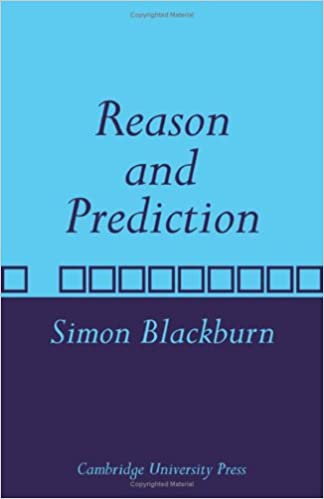
(An original study of the philosophical problems associate...)
An original study of the philosophical problems associated with inductive reasoning. Like most of the main questions in epistemology, the classical problem of induction arises from doubts about a mode of inference used to justify some of our most familiar and pervasive beliefs. The experience of each individual is limited and fragmentary, yet the scope of our beliefs is much wider; and it is the relation between belief and experience, in particular the belief that the future will in some respects resemble the past and the unobserved the observed, which forms the subject of this book. Dr. Blackburn's first aim is to state the problem of induction properly, to show that there does exist a genuine problem immune to the solutions in vogue at present, yet no tin principle insoluble. He gives an extended and original account of the concept of a reason and goes on to discuss prediction. In the end, Dr. Blackburn produces a rationale for belief in certain short-term predictions based on his reinterpretation of the classical principle of indifference. He claims that a justification for induction can be found along the lines he has suggested and must indeed be found there if anywhere.
https://www.amazon.com/Reason-Prediction-Simon-Blackburn/dp/0521087422/ref=sr_1_1?dchild=1&keywords=Reason+and+Prediction+Simon+Blackburn&qid=1601608655&sr=8-1
1973
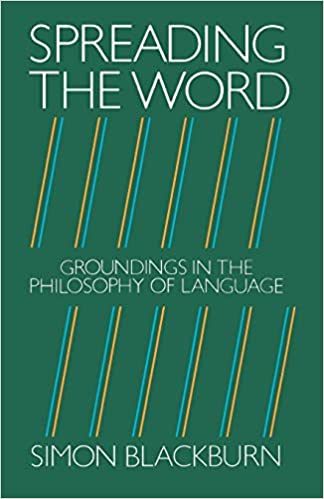
(The book provides a comprehensive introduction to the maj...)
The book provides a comprehensive introduction to the major philosophical theories attempting to explain the workings of language.
https://www.amazon.com/Spreading-Word-Groundings-Philosophy-Language/dp/019824651X/ref=sr_1_1?dchild=1&keywords=Spreading+the+Word+Simon+Blackburn&qid=1601608706&sr=8-1
1984
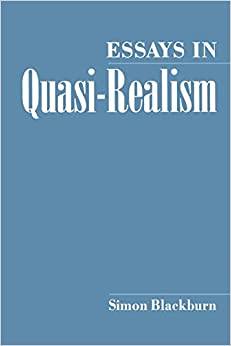
(This volume collects some influential essays in which Sim...)
This volume collects some influential essays in which Simon Blackburn, one of our leading philosophers, explores one of the most profound and fertile of philosophical problems: the way in which our judgments relate to the world. This debate has centered on realism, or the view that what we say is validated by the way things stand in the world, and a variety of oppositions to it. Prominent among the latter are expressive and projective theories, but also a relaxed pluralism that discourages the view that there are substantial issues at stake. The figure of the "quasi-realist" dramatizes the difficulty of conducting these debates. Typically philosophers thinking of themselves as realists will believe that they alone can give a proper or literal account of some of our attachments - to the truth, to facts, to the independent world, to knowledge and certainty. The quasi-realist challenge, developed by Blackburn in this volume, is that we can have those attachments without any metaphysic that deserves to be called realism so that the metaphysical picture that goes with our practices is quite idle. The cases treated here include the theories of value and knowledge, modality, probability, causation, intentionality and rule-following, and explanation. A substantial new introduction has been added, drawing together some of the central themes. The essays articulate a fresh alternative to a primitive realist/anti-realist opposition, and their cumulative effect is to yield a new appreciation of the delicacy of the debate in these central areas.
https://www.amazon.com/Essays-Quasi-Realism-Simon-Blackburn/dp/0195082249/ref=sr_1_1?dchild=1&keywords=Essays+in+Quasi-realism+Simon+Blackburn&qid=1601608877&sr=8-1
1993
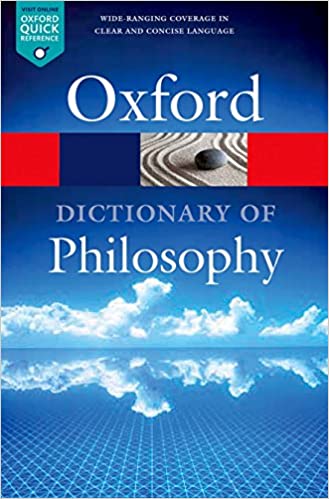
(This bestselling dictionary is written by one of the lead...)
This bestselling dictionary is written by one of the leading philosophers of our time, and it is widely recognized as the best dictionary of its kind. Comprehensive and authoritative, it covers every aspect of philosophy from Aristotle to Zen. With clear and concise definitions, it provides lively and accessible coverage of not only Western philosophical traditions, but also themes from Chinese, Indian, Islamic, and Jewish philosophy. Entries include over 400 biographies of famous and influential philosophers, in-depth analysis of philosophical terms and concepts, and a chronology of philosophical events stretching from 10,000 BC to the present day. New entries on philosophy of economics, social theory, neuroscience, philosophy of the mind, and moral conceptions bring the third edition of this dictionary fully up to date. Fully cross-referenced and containing over 3,300 alphabetical entries, it is the ideal introduction to philosophy for anyone with an interest in the subject, and it is an indispensable work of reference for students and teachers.
https://www.amazon.com/Oxford-Dictionary-Philosophy-Quick-Reference/dp/0198735308/ref=sr_1_1?dchild=1&keywords=The+Oxford+Dictionary+of+Philosophy+Simon+Blackburn&qid=1601608934&sr=8-1
1994

(Simon Blackburn puts forward a compelling and original ph...)
Simon Blackburn puts forward a compelling and original philosophy of human motivation and morality. Why do we behave as we do? Can we improve? Is our ethics at war with our passions, or is it an upshot of those passions? Blackburn seeks the answers to such questions in an exploration of the nature of moral emotions and the structures of human motivation. He develops naturalistic ethics, which integrates our understanding of ethics with the rest of our understanding of the world we live in. His theory does not debunk the ethical by reducing it to the non-ethical, and it banishes the specters of skepticism and relativism that have haunted recent moral philosophy. Ruling Passions reveals how ethics can maintain its authority even though it is rooted in the very emotions and motivations that it exists to control.
https://www.amazon.com/Ruling-Passions-Theory-Practical-Reasoning/dp/0199241392/ref=sr_1_1?dchild=1&keywords=Ruling+Passions+Simon+Blackburn&qid=1601608973&sr=8-1
1998
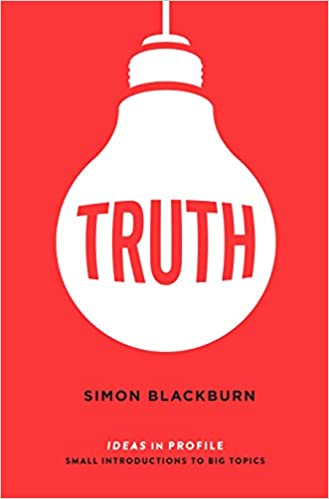
(Truth has always been a thorny topic. How does it work? W...)
Truth has always been a thorny topic. How does it work? Who decides what it is? And why is it seen as so important? In this lucid introduction to the topic, leading scholar Simon Blackburn describes the main approaches to the notion of truth and considers how these relate to different perspectives on belief, interpretation, facts, knowledge, and action. Understanding what constitutes truth has practical value in every aspect of life, and whether you are voting in an election or finding an excuse for being late, Professor Blackburn's clear and incisive account will illuminate your choice, and stimulate, inform and entertain you along the way.
https://www.amazon.com/Truth-Ideas-Profile-Simon-Blackburn/dp/1781257221/ref=sr_1_4?dchild=1&keywords=truth+Simon+Blackburn&qid=1601609057&s=books&sr=1-4
1999

(This is a book about the big questions in life: knowledge...)
This is a book about the big questions in life: knowledge, consciousness, fate, God, truth, goodness, justice. It is for anyone who believes there are big questions out there but does not know how to approach them. Think sets out to explain what they are and why they are important. Simon Blackburn begins by putting forward a convincing case for the study of philosophy and goes on to give the reader a sense of how the great historical figures such as Descartes, Hume, Kant, and Wittgenstein have approached its central themes. Each chapter explains a major issue and gives the reader a self-contained guide through the problems that philosophers have studied. The large scope of topics covered range from skepticism, the self, mind and body, and freedom to ethics and the arguments surrounding the existence of God. Lively and approachable, this book is ideal for all those who want to learn how the basic techniques of thinking shape our existence.
https://www.amazon.com/Think-Compelling-Introduction-Simon-Blackburn/dp/0192854259/ref=sr_1_1?dchild=1&keywords=Think%3A+A+Compelling+Introduction+to+Philosophy.+Simon+Blackburn&qid=1601609738&s=books&sr=1-1
1999
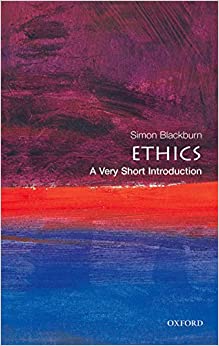
(Our self-image as moral, well-behaved creatures is dogged...)
Our self-image as moral, well-behaved creatures is dogged by skepticism, relativism, hypocrisy, and nihilism, by the fear that in a Godless world science has unmasked us as creatures fated by our genes to be selfish and tribalistic, or competitive and aggressive. In this clear introduction to ethics, Simon Blackburn tackles the major moral questions surrounding birth, death, happiness, desire, and freedom, showing us how we should think about the meaning of life, and how we should mistrust the soundbite-sized absolutes that often dominate moral debates. About the Series: Combining authority with wit, accessibility, and style, Very Short Introductions offer an introduction to some of life's most interesting topics. Written by experts for the newcomer, they demonstrate the finest contemporary thinking about the central problems and issues in hundreds of key topics, from philosophy to Freud, quantum theory to Islam.
https://www.amazon.com/Ethics-Very-Short-Introduction-Introductions/dp/0192804421/ref=sr_1_1?dchild=1&keywords=Ethics%3A+A+Very+Short+Introduction+Simon+Blackburn&qid=1601609806&s=books&sr=1-1
2001
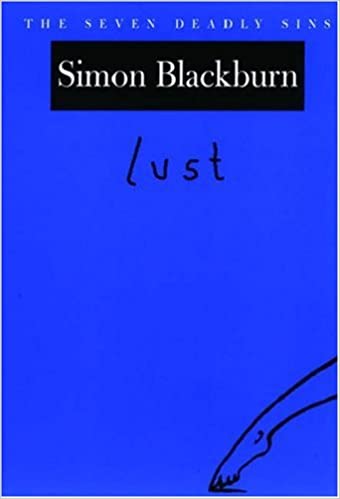
(Lust, says Simon Blackburn, is furtive, headlong, always ...)
Lust, says Simon Blackburn, is furtive, headlong, always sizing up opportunities. It is a trail of clothing in the hallway, the trashy cousin of love. But be that as it may, the aim of this delightful book is to rescue lust "from the denunciations of old men of the deserts, to deliver it from the pallid and envious confessor and the stocks and pillories of the Puritans, to drag it from the category of sin to that of virtue." Blackburn, author of such popular philosophy books as Think and Being Good, here offers a sharp-edged probe into the heart of lust, blending together insight from some of the world's greatest thinkers on sex, human nature, and our common cultural foibles. Blackburn takes a wide-ranging, historical approach, discussing lust as viewed by Aristophanes and Plato, lust in the light of the Stoic mistrust of emotion, and the Christian fear of the flesh that catapulted lust to the level of deadly sin. He describes how philosophical pessimists like Schopenhauer and Sartre contributed to our thinking about lust and explores the false starts in understanding lust represented by Freud, Kinsey, and modern "evolutionary psychology." But most important, Blackburn reminds us that lust is also life-affirming, invigorating, fun. He points to the work of David Hume (Blackburn's favorite philosopher) who saw lust not only as a sensual delight but also "a joy of the mind."
https://www.amazon.com/Lust-Seven-Deadly-Simon-Blackburn/dp/0195312074/ref=sr_1_1?dchild=1&keywords=Lust+Simon+Blackburn&qid=1601609867&s=books&sr=1-1
2004
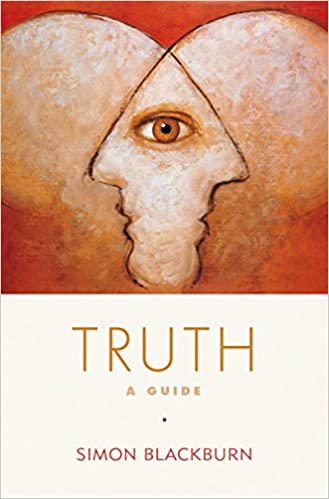
(The front lines of this war are well defined. On one side...)
The front lines of this war are well defined. On one side are those who believe in plain, unvarnished facts, rock-solid truths that can be found through reason and objectivity - that science leads to truth, for instance. Their opponents mock this idea. They see the dark forces of language, culture, power, gender, class, ideology, and desire - all subverting our perceptions of the world, and clouding our judgment with false notions of absolute truth. Beginning with an early skirmish in the war - when Socrates confronted the sophists in ancient Athens - Blackburn offers a penetrating look at the longstanding battle these two groups have waged, examining the philosophical battles fought by Plato, Protagoras, William James, David Hume, Hans-Georg Gadamer, Jacques Derrida, Michel Foucault, Richard Rorty, and many others, with a particularly fascinating look at Nietzsche. Among the questions Blackburn considers are: is science mere opinion, can historians understand another historical period, and indeed can one culture ever truly understand another. Blackburn concludes that both sides have merit, and that neither has exclusive ownership of truth. What is important is that, whichever side we embrace, we should know where we stand and what is to be said for our opponents.
https://www.amazon.com/Truth-Guide-Simon-Blackburn-ebook/dp/B00UNRO9HA/ref=sr_1_2?dchild=1&keywords=Truth%3A+A+Guide&qid=1601609977&s=digital-text&sr=1-2
2005
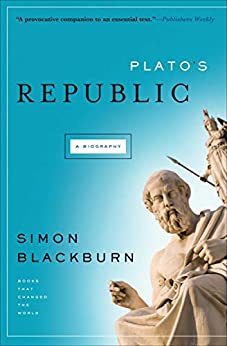
(Plato is perhaps the most significant philosopher who eve...)
Plato is perhaps the most significant philosopher who ever lived and The Republic, composed in Athens in about 375 BC, is widely regarded as his most famous dialogue. Its discussion of the perfect city - and the perfect mind - laid the foundations for Western culture and has been the cornerstone of Western philosophy. As the distinguished Cambridge professor Simon Blackburn points out, it has probably sustained more commentary and been subject to more radical and impassioned disagreement, than almost any other text in the modern world.
https://www.amazon.com/Platos-Republic-Biography-Books-Changed-ebook/dp/B008V43RRU/ref=sr_1_1?dchild=1&keywords=Plato%27s+Republic%3A+A+Biography+Blackburn&qid=1601610059&s=books&sr=1-1
2006

(David Hume is generally recognized as England's greatest ...)
David Hume is generally recognized as England's greatest philosopher, as well as a notable historian and essayist. Yet his work is delicately poised between skepticism and naturalism, between despair at the limited powers of the mind and optimism at the progress we can make by understanding it. This difficult balancing act has given rise to a multitude of different interpretations: reading Hume has never been free of controversy. In this new approach to his writings, Simon Blackburn describes how Hume can be placed as one of the earliest, and most successful, evolutionary psychologists, weaving plausible natural accounts of the way we should think of ourselves, and of how we have come to be what we are.
https://www.amazon.com/How-Read-Hume-Simon-Blackburn/dp/1847080332/ref=sr_1_1?dchild=1&keywords=How+to+read+Hume+Blackburn&qid=1601610138&s=books&sr=1-1
2008

(In What Do We Really Know? Simon Blackburn addresses the ...)
In What Do We Really Know? Simon Blackburn addresses the twenty most-asked philosophical questions, including 'Can machines think?', 'What is the meaning of life?', 'Is death to be feared?', 'Why be good?', 'What am I?' and 'What do we really know?' Each 3000-word essay examines a question that has eternally perplexed enquiring minds and provides answers from history's great thinkers.
https://www.amazon.com/What-Really-Know-Questions-Philosophy/dp/1780875878/ref=sr_1_1?dchild=1&keywords=What+do+we+really+know%3F+-The+Big+Questions+of+Philosophy+Blackburn&qid=1601610192&s=books&sr=1-1
2009
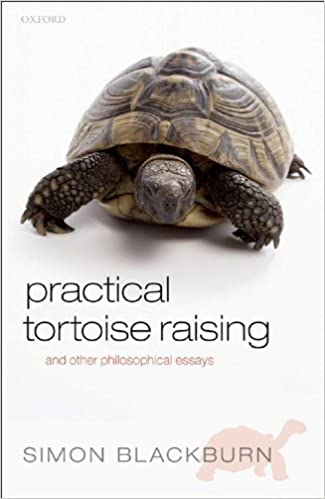
(Simon Blackburn presents a selection of his philosophical...)
Simon Blackburn presents a selection of his philosophical essays from 1995 to 2010. He offers engaging and illuminating discussions of various problems that arise when such familiar notions as representation, truth, reason, and assertion are applied in the sphere of practical thought. It is puzzling how our thinking gets to grip with such things as values and norms. Blackburn explores how we can try to understand what we say in terms of what we are doing when we say it. He investigates how propositions interact with linguistic expressions whose primary function is identified in terms of actions performed in expressing commitments with them when those commitments are thought of in practical rather than descriptive terms. He broadens his investigation from semantic questions to wider issues of pluralism, pragmatism, philosophy of mind, and the nature of practical reasoning.
https://www.amazon.com/gp/product/B006BY2D68/ref=dbs_a_def_rwt_hsch_vapi_tkin_p2_i0
2010

(Everyone deplores narcissism, especially in others. The v...)
Everyone deplores narcissism, especially in others. The vain are by turns annoying or absurd, offending us whether they are blissfully oblivious or proudly aware of their behavior. But are narcissism and vanity really as bad as they seem? Can we avoid them even if we try? In Mirror, Mirror, Simon Blackburn, the author of such best-selling philosophy books as Think, Being Good, and Lust, says that narcissism, vanity, pride, and self-esteem are more complex than they first appear and have innumerable good and bad forms. Drawing on philosophy, psychology, literature, history, and popular culture, Blackburn offers an enlightening and entertaining exploration of self-love, from the myth of Narcissus and the Christian story of the Fall to today's self-esteem industry.
https://www.amazon.com/Mirror-Uses-Abuses-Self-Love-ebook/dp/B00GMSUUUY/ref=sr_1_1?keywords=Mirror%2C+Mirror%3A+The+Uses+and+Abuses+of+Self-Love+Blackburn&qid=1601610279&s=books&sr=1-1
2014

(Truth is not just a recent topic of contention. Arguments...)
Truth is not just a recent topic of contention. Arguments about it have gone on for centuries. Why is the truth important? Who decides what the truth is? Is there such a thing as an objective, eternal truth, or is truth simply a matter of perspective, of linguistic or cultural vantage point? In this concise book, Simon Blackburn provides an accessible explanation of what truth is and how we might think about it. The first half of the book details several main approaches to how we should think about, and decide, what is true. These are philosophical theories of truth such as the correspondence theory, the coherence theory, deflationism, and others. He then examines how those approaches relate to truth in several contentious domains: art, ethics, reasoning, religion, and the interpretation of texts. Blackburn's overall message is that truth is often best thought of not as a product or an endpoint that is 'finally' achieved, but - as the American pragmatist thinkers thought of it - as an ongoing process of inquiry. The result is an accessible and tour through some of the deepest and thorniest questions philosophy has ever tackled.
https://www.amazon.com/Truth-Simon-Blackburn/dp/0190867213/ref=sr_1_1?dchild=1&keywords=On+Truth+Blackburn&qid=1601610349&s=books&sr=1-1
2018
educator philosopher author ethician
Simon Walter Blackburn was born on July 12, 1944, in Chipping Sodbury, South Gloucestershire, United Kingdom to the family of Cuthbert Walter Blackburn and Harriet Edna Walton.
Simon Blackburn attended Clifton College in Bristol in 1957-1962. He graduated as a Bachelor of Arts from Trinity College Cambridge in 1965. Blackburn earned his Doctor of Philosophy from Churchill College Cambridge in 1969.
Simon Blackburn was a Fellow and Tutor in Philosophy at Pembroke College, Oxford from 1969 up to 1990. In 1990-2001 he held the position of the Edna J. Koury Distinguished Professor of Philosophy at the University of North Carolina at Chapel Hill. After that, he was until 2011 the Bertrand Russell Professor of Philosophy at the University of Cambridge and remains a Fellow of Trinity College Cambridge. He is a part-time Distinguished Visiting Research Professor at the University of North Carolina at Chapel Hill and the Professor at the New College of the Humanities.
Blackburn has held several visiting appointments including the University of Melbourne University of British Columbia Oberlin College Princeton University Ohio State University and Universidad Autonomia da Mexico. For ten years he was an adjunct professor at the Research School of Social Sciences Australian National University Canberra. Blackburn is known for his many appearances in the British media such as BBC Radio 4’s The Moral Maze and his many publications which span popular and academic moral philosophy. From 1984 ap to 1990 he edited the journal Mind.
Blackburn's principal works are Reason and Prediction (1973); Spreading the Word: Groundings in the Philosophy of Language (1984); Essays in Quasi-Realism (1993); The Oxford Dictionary of Philosophy (1996); Ruling Passions: A Theory of Practical Reasoning (1998); Think: A Compelling Introduction to Philosophy (2001); Being Good: A Short Introduction to Ethics (2002); Lust: The Seven Deadly Sins (2003); Truth: A Guide for the Perplexed (2005); Plato's Republic: A Biography (2006); How to Read Hume (2008); Ethics: A Very Short Introduction (2001); Mirror, Mirror: The Uses and Abuses of Self-Love (2014); and On Truth (2018).
Professor Simon Blackburn is well known for his efforts to make philosophy accessible to a wider public, Simon is one of the country’s leading philosophers. His expertise and experience helped to establish national and international reputation of an expert in metaethics and the philosophy of language. He also has gained recognition for his efforts to popularise philosophy.
(In What Do We Really Know? Simon Blackburn addresses the ...)
2009(Our self-image as moral, well-behaved creatures is dogged...)
2001(This volume collects some influential essays in which Sim...)
1993(Plato is perhaps the most significant philosopher who eve...)
2006(This bestselling dictionary is written by one of the lead...)
1994(The book provides a comprehensive introduction to the maj...)
1984(David Hume is generally recognized as England's greatest ...)
2008(This is a book about the big questions in life: knowledge...)
1999(Simon Blackburn puts forward a compelling and original ph...)
1998(An original study of the philosophical problems associate...)
1973(Simon Blackburn presents a selection of his philosophical...)
2010(Lust, says Simon Blackburn, is furtive, headlong, always ...)
2004(Everyone deplores narcissism, especially in others. The v...)
2014(Truth is not just a recent topic of contention. Arguments...)
2018(The front lines of this war are well defined. On one side...)
2005(Truth has always been a thorny topic. How does it work? W...)
1999Blackburn is an atheist who prefers to call himself infidel, id est a non-believer who considers the question of the God's existence inconsistent.
Simon Blackburn hasn't publicly spoken in favor of any political force ann describes his political stance as "middle."
Simon Blackburn is well regarded as a proponent of a distinctive approach to ethics and a defender of neo-Humean views on a variety of topics. He encourages his readers to look not to philosophical figures such as Nietzsche for the truth, but instead to seek truth in the personal judgments and assessments that facilitate everyday life. Blackburn does not disavow absolutist and relativist philosophies, but rather finds a common ground between the two, a place where truth emerges out of individual actions.
Blackburn advocates an approach to philosophy that bridges the divide between philosophical realism (basically, the idea that philosophical concepts exist independently of our ability to articulate them) and projectivism or antirealism (the idea that our decisions are defined primarily by our reaction to philosophical dilemmas).
Blackburn examines different ideas about how people make ethical decisions and concludes that they all fall short of the goal of providing a philosophical system of morals and ethics in the twenty-first century. Blackburn suggests, that ethical principles are those that would be agreed in any reasonable cooperative procedure for coming to one mind about our conduct. In other words, Blackburn's point of view can help the modern world negotiate between the extreme moral positions that morals and ethics do not exist (that they are imposed by individuals on objective reality) and that morals and ethics are absolute (and that therefore those who disagree with them are by definition immoral, unethical, and - in some cases - evil).
In Plato's Republic: A Biography, Blackburn examines the implications of the most famous work of one of the original realist philosophers - the ancient Greek thinker Plato. Blackburn points out that Plato has been misunderstood by a variety of modern philosophers, including the twentieth-century thinkers Karl Popper and Leo Strauss and that what Plato does is confront a variety of skeptics, people like Thrasymachus who say that morality is bunkum, that it's all power.
Quotations:
"An ethic gone wrong is an essential preliminary to the sweatshop or the concentration camp and the death march."
"Since there is no telling in advance where it may lead, reflection can be seen as dangerous."
"Chance is as relentless as a necessity."
"Paradigms can be asked to show their worth, an some of them do not stand up."
"But if nothing does as well as something about which nothing can be said, it vanishes."
"A god that created the world and then walked off the site leaving it to its own devices is not a fit object of worship, nor a source of moral authority."
"We hope for lives whose story leaves us looking admirable; we like our weaknesses to be hidden and deniable... We want to enjoy our lives, and we want to enjoy them with a good conscience ... Ethics is disturbing. We are often vaguely uncomfortable when we think of such things as exploitation of the world's resources, or the way our comforts are provided by the miserable labour conditions of the third world ... Racists and sexists, like antebellum slave owners in America, always have to tell themselves a story that justifies their system."
Blackburn has been a Vice-President of the British Humanist Association. He is also an Honorary Foreign Member of the American Academy of Arts and Sciences, as well as a Fellow of the British Academy. In addition, he is a member of the American Psychological Association and the National Association for Mental Health.
Simon Blackburn has been known to turn his highly attuned analytical radar to ideas of the times. Apart from his academic work he pursues such interests as mountaineering, photography, and sailing.
Simon Blackburn married an editor Angela Margaret Bowles in 1968. They have two children: Gwendolen and James.
